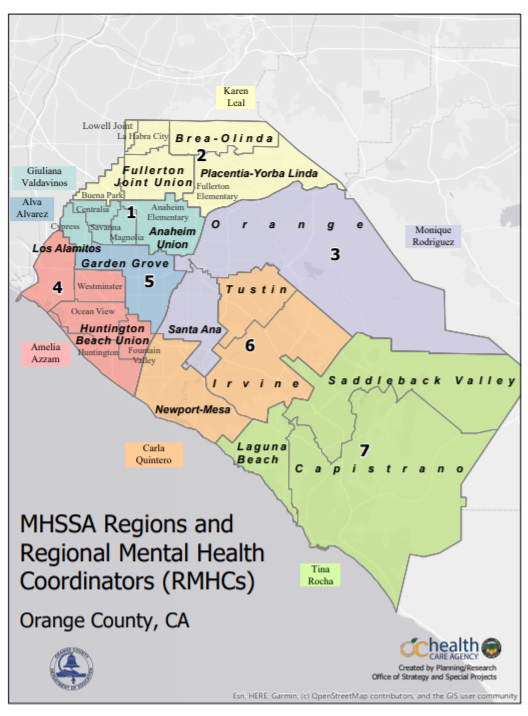
The Orange County Department of Education continues to expand its efforts to address mental health needs, including supporting local school districts as they strengthen their own infrastructures to help students and families.
With funding from the Mental Health Student Services Act, and in partnership with the Orange County Health Care Agency and school districts, OCDE was able to hire seven regional mental health coordinators during the pandemic, creating a countywide network to bolster mental health infrastructures and protocols.
Mayu Iwatani, OCDE’s manager of mental health and wellness care coordination, says schools and districts were already facing a shortage of mental health services and professionals in the field before COVID-19, and the situation has been exacerbated by increased demand across the country.
“We’re hiring three more coordinators with specialized areas of training such as substance use and behavioral intervention,” she said.
We sat down with Iwatani to discuss a few of the ways these coordinators are helping to fortify the mental health of children and teenagers throughout Orange County.
Adverse Childhood Experiences
Data shows students experiencing troubling levels of sadness and suicidal ideation were on the rise even before the pandemic. According to the 2018-19 California Healthy Kids Survey, 20 percent of fifth-grade students surveyed reported feeling sad most or all of the time and about 33 percent of seventh- and 11th-graders reported experiencing depression, while 15 percent contemplated suicide.
“I think of the pandemic as adding one point to many youth’s Adverse Childhood Experiences score, as many experienced a loss of normalcy in some form,” Iwatani said. “We all weathered the same storm but were in different boats depending on available resources and support systems.”
Adverse Childhood Experiences, or ACEs, are potentially traumatic events that occur in the lives of children before age 18. These experiences can include physical and emotional abuse, neglect, substance abuse, caregiver mental illness and household violence. Traumatic events in childhood can be emotionally painful or distressing and can have effects that persist for years.

Regional mental health coordinators
This Mental Health Student Services Act grant program was established to strengthen mental health partnerships between county mental health or behavior health departments and community-based organizations and local educational entities. The goal is to increase access to mental health services and remove barriers to better serve students and families.
The seven coordinators hired by OCDE are each assigned to a region in Orange County where they serve a wide-range of mental health needs. They work closely with school districts and charter school partners to increase access to local mental health organizations.
Tailoring support for local school districts
Between September 2020 and August 2022, the coordinators held 582 individual meetings with 29 school districts and Oxford Preparatory School to identify and set priorities, plan trainings and service expansions, and work on improving the infrastructure of mental health response.
“We value the expertise and knowledge that our districts have of their specific school community and their needs,” said Iwatani. “We meet regularly with the mental health leads of the districts and ask them how we can support them.”
During the same time frame, the coordinators presented a wide range of training workshops to more than 7,000 educators, administrators, parents or caregivers and students. The sessions have been designed to improve awareness and understanding of mental health topics — and how to navigate services. Along with mental health awareness basics, trainings cover such topics as cognitive behavioral interventions for trauma in schools, trauma-informed practices and staff wellness.
“We ask mental health leads of districts about how we can support them, what services would benefit their community and which families would they like to refer for care coordination,” Iwatani said. “These conversations determine the training offerings we provide and how each coordinator responds to each district or region.”
Advocating for mental health awareness

OCDE continues to support and lead a multitude of programs and services designed to address mental health.
In partnership with CHOC and with the continuing goal of improving students’ mental health and academic outcomes, the department has established more than 20 WellSpaces at schools throughout the county.
WellSpaces are tranquil spaces that give students opportunities to decompress, learn mindfulness strategies, and develop self-regulation and coping skills. Each space is intentionally located within a school campus and provides universal support to students to strengthen and improve their social and emotional skills.
Providing on-campus WellSpaces and having trained mental health professionals available at no cost to students or families removes long-standing barriers, including affordability, transportation and even stigmas. Additional efforts are being made to bridge language divides.
“The saying ‘It takes a village to raise a child’ is more true now,” said Iwatani. “What we need are caring adults who can work together to provide students with a kind and compassionate environment where they can ask for support as they need it without stigma or judgment.”
For additional information about the Mental Health Student Services Act grant and the regions each mental health coordinator serves, visit OCDE’s Educational Services department website.
